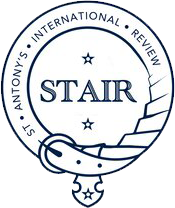STAIR is accepting submissions to the following sections of its current issue, Issue 20.1- Fascism:
General Section: manuscripts on topics in the fields of International Relations/Affairs, Political Science, Contemporary/International History, Area Studies, Development Studies, and related fields. Articles may take theoretical or policy-oriented approaches.
Book Review: reviews of books in International Affairs or related fields which have been published within the last three calendar years. Please find a suggested shortlist below.
Theme Section: manuscripts on the theme of Fascism as outlined in the following description.
ISSUE 20.1- FASCISM





Fascism is a nebulous term, one variously defined by scholars and all-too-often bandied about in political discourse. George Orwell aptly captured this ambiguity in 1944: ‘I have heard it applied to… Kipling, Gandhi, Chiang Kai-Shek, homosexuality, Priestley’s broadcasts, Youth Hostels, astrology, women, dogs and I do not know what else.’
In the twenty-first century, the resurgence of the far right has imposed a sizeable imprint on electoral politics, alarmed scholars concerned with the integrity of liberal democracy and the ‘rules-based international order’, evoked comparisons with the heyday of interwar fascism, inspired critical examinations of the understudied dynamics of far-right politics in postcolonial states and the Global South, and encouraged experts to trace the mainstreaming of bizarre far-right conspiracy theories. In this issue, STAIR is primarily interested in current manifestations of far-right, ultranationalist politics and the degree to which any such actors and movements can be productively understood as fascist or how such contemporary phenomenon may be studied against the wider backdrop of fascism’s twentieth-century history.
The following sub-topics are of particular interest to STAIR:
Conceptual Foundations: How do contemporary far-right movements differ from past or present forms of nationalism and what are their defining attributes? Why has the F-word returned to mainstream scholarly writing and political discourse alike? To what extent is it useful to apply, or what are the limits of ascribing, the ‘fascist’ label to present movements, ideas, or governments? For example, is Putinist Russia a fascist regime? May we refer to Donald Trump as a fascist?
Conspiracy Theories: A range of interlinked far-right conspiracies abound, from QAnon and the ‘Big Lie’, to claims of a so-called ‘white genocide’ and wider speculation about imagined globalist machinations. Why have such conspiracies been seemingly mainstreamed? How have changing demographics, migration patterns, and refugee crises fuelled conspiratorial thinking about a supposed ‘Great Replacement’? To what extent is the paranoid style of politics a hallmark of ultranationalist politics?
Transnationalism: How do far-right politics transcend borders? What ideological divisions exist between far-right movements in, for example, Europe and North America? Whether it is the Conservative Political Action Conference or Telegram group chats, what organisations and channels are used to spread far-right ideologies? How does the transnational diffusion of the far right compare to analogous efforts during the interwar period?
State, Identity, and Elites: How do states use fascist politics to consolidate power and legitimise their authority? What role does the state play in constructing and enforcing identification with far-right politics in democracies and non-democracies alike? What role does conservative civil society play in constructing and/or amplifying the political agenda of elites? What is the relationship between Silicon Valley and the far right?
Technology: To what extent has social media and other forms of digital communications technology helped to promote far-right and fascistic politics? What is the relationship between advances in digital technology and the rise of far-right movements or groups, including, but not limited to, the Boogaloo movement, Active Clubs, and the Freedom Convoy?
Opposition: How has civil society, political movements, and international actors responded to the resurgence of the far right? What coalitions and methods of resistance and opposition have emerged in its stead? Are there any fruitful comparisons to be drawn from the twentieth-century history of anti-fascism?
While we desire authors to engage with the utility of the ‘fascist’ label in the contemporary context, we accept critiques of fascism as an analytical category in scholarly and popular discourse. Moreover, we welcome objections to the politics of the far right; however, we caution prospective authors to not merely criticise these developments, but also imagine and investigate where they come from and how they can be fruitfully understood. As such, the purpose of this issue is not solely to act as a venue for scholarly exchange on the practice of anti-fascism, although such submissions, if they provide a deeper analysis of the contemporary far right in the process, are encouraged.
-
Arendt, Hannah. The Origins of Totalitarianism. New York: Harcourt Brace Jovanovich, 1973.
Bueno de Mesquita, Bruce and Alastair Smith, The Dictator's Handbook: Why Bad Behavior Is Almost Always Good Politics. New York: Public Affairs, 2012.
Beiner, Ronald. Dangerous Minds: Nietzsche, Heidegger, and the Return of the Far Right. Philadelphia: University of Pennsylvania Press, 2018.
Guriev, S. M., and Daniel Treisman. Spin Dictators: The Changing Face of Tyranny in the 21st Century. Princeton ; Oxford: Princeton University Press, 2022.
Hermansson, Patrik, David Lawrence, Joe Mulhall, and Simon Murdoch. The International Alt-Right: Fascism for the 21st Century? Abingdon, Oxon: Routledge, 2020.
Levitsky, Steven, and Daniel Ziblatt. How Democracies Die. Harlow, England: Penguin Books, 2019.
McAdams, A. James, and Alejandro Castrillón, eds. Contemporary Far-Right Thinkers and the Future of Liberal Democracy. Abingdon, Oxon: Routledge, 2022.
Shekhovtsov, Anton. Russia and the Western Far Right: Tango Noir. Abingdon, Oxon: Routledge, 2018.
Teitelbaum, Benjamin R. War for Eternity: The Return of Traditionalism and the Rise of the Populist Right. UK USA Canada Ireland Australia India New Zealand South Africa: Penguin Books, 2021.
Traverso, Enzo, and Régis Meyran. The New Faces of Fascism: Populism and the Far Right. London ; Brooklyn, NY: Verso, 2019.
Valencia-García, Louie Dean, ed. Far-Right Revisionism and the End of History: Alt / Histories. Routledge Approaches to History, vol. 37. New York: Routledge/Taylor & Francis Group, 2020.
Wendling, Mike. Alt-Right: From 4chan to the White House. Halifax ; Winnipeg: Fernwood Publishing, 2018.
